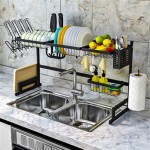16 or 18 Gauge Sink: Which is Best for Your Kitchen?
When it comes to choosing a sink for your kitchen, there are several factors to consider, including the size, shape, and material. But one of the most important factors to consider is the gauge of the sink. The gauge of a sink refers to the thickness of the stainless steel used to make it. The lower the gauge number, the thicker the stainless steel. So, for example, a 16 gauge sink is made of thicker stainless steel than an 18 gauge sink.
So, which gauge is better for your kitchen, 16 or 18? There are pros and cons to both gauges, so the best way to decide is to consider your own needs and preferences.
### Pros of 16 Gauge Sinks *Durability:
16 gauge sinks are thicker and more durable than 18 gauge sinks, so they are less likely to dent or scratch. This makes them a good choice for busy kitchens where the sink gets a lot of use. *Resistance to corrosion:
16 gauge sinks are also more resistant to corrosion than 18 gauge sinks. This means they are less likely to rust or develop other types of damage over time. *Heat resistance:
16 gauge sinks are more resistant to heat than 18 gauge sinks. This means they can withstand higher temperatures without warping or cracking. ### Cons of 16 Gauge Sinks *Price:
16 gauge sinks are more expensive than 18 gauge sinks. This is because they use more stainless steel and require more labor to manufacture. *Weight:
16 gauge sinks are heavier than 18 gauge sinks. This can make them more difficult to install and can put stress on the cabinets that support them. ### Pros of 18 Gauge Sinks *Price:
18 gauge sinks are less expensive than 16 gauge sinks. This makes them a more budget-friendly option for many homeowners. *Weight:
18 gauge sinks are lighter than 16 gauge sinks. This makes them easier to install and puts less stress on the cabinets that support them. *Availability:
18 gauge sinks are more widely available than 16 gauge sinks. This means you are more likely to find the style and size you want in an 18 gauge sink. ### Cons of 18 Gauge Sinks *Durability:
18 gauge sinks are thinner and less durable than 16 gauge sinks, so they are more likely to dent or scratch. This makes them less ideal for busy kitchens where the sink gets a lot of use. *Resistance to corrosion:
18 gauge sinks are also less resistant to corrosion than 16 gauge sinks. This means they are more likely to rust or develop other types of damage over time. *Heat resistance:
18 gauge sinks are less resistant to heat than 16 gauge sinks. This means they are more likely to warp or crack if they are exposed to high temperatures. ### Summary of 16 vs 18 Gauge Sinks Ultimately, the best way to decide which gauge sink is right for your kitchen is to consider your own needs and preferences. If you are looking for a sink that is durable, resistant to corrosion and heat, and will last for many years, then a 16 gauge sink is a good choice. However, if you are on a budget or you are looking for a sink that is lightweight and easy to install, then an 18 gauge sink may be a better option.
16 Gauge Vs 18 Stainless Steel Sinks

Difference Between 16 And 18 Gauge Sinks

What Is Sink Gauge Stainless Com

16 Gauge Vs 18 Sink A Comprehensive Comparison

Difference Between 16 And 18 Gauge Sinks

Stainless Steel Sink Gauges 16 Gauge Vs 18 Fenwick

Upc Sus304 Grade 16 18 Gauge Topmount 5050 Double Bowl Stainless Steel Sink Handmade For Kitchen China Made In Com

16 X 20 Inch 18 Gauge Large Topmount Drop In Single Bowl Basin Handmade Sus304 Stainless Steel Kitchen Sink Brushed Nickel With Drainb

Franke Cube Cux11015 18 Gauge Stainless Steel Silver Single Bowl Kitchen Sink 16 1 2 17 3 4 Inches At 998 Piece In Chennai

Difference Between 16 And 18 Gauge Sinks







